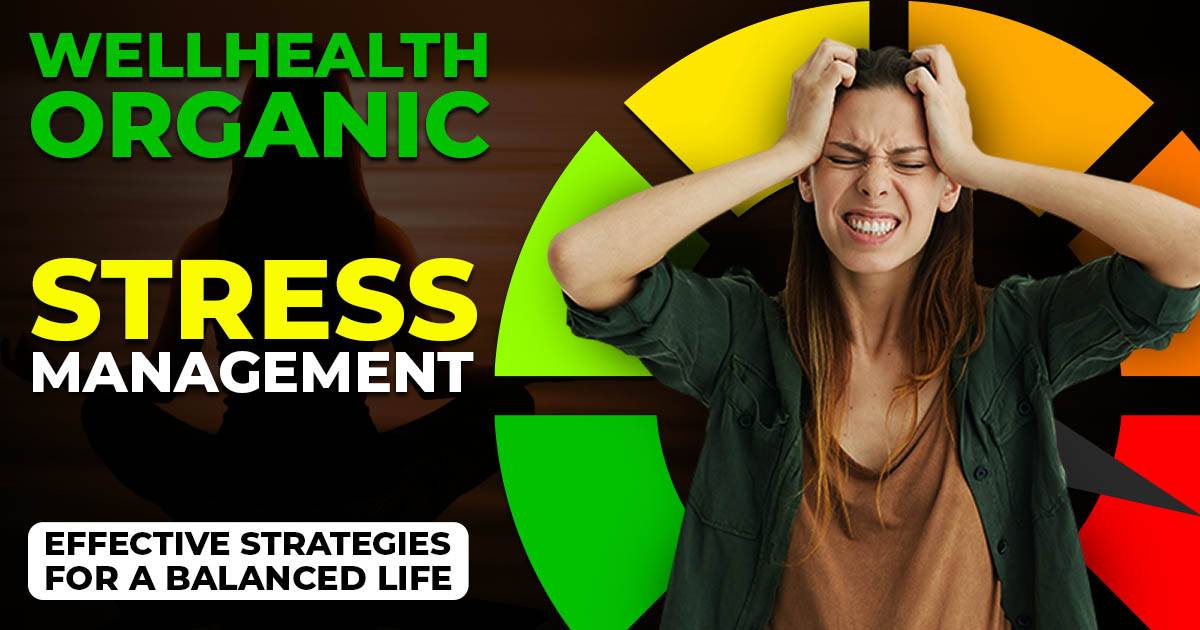With WellHealthOrganic Stress Management, you can transform yourself from Stress and anxiety to peace. In the busy world, Stress has become a part of life. Everyone, from students to older adults, suffers from Stress for some time. Students suffer from the Stress of exams and careers; adults suffer from the Stress of jobs and family. Old people suffer because of their health. However, through WellHealthOrganic, you can manage your Stress and live as peacefully and happily as possible. But for that, you will have to find the signs of Stress and then work on them with a positive attitude. So, let’s look at stress management.
What is WellHealthOrganic?
WellHealthOrganic is a health and wellness company that provides organic, plant-related products to its customers. The company’s mission is to promote healthy living and well-being by providing high-quality, affordable, and sustainable health and wellness products. They offer a collection of products, such as superfoods, herbal supplements, protein powder, personal care products, and more. This company’s products are free from harmful chemical additives.
Benefits of WellHealthOrganic Stress Management:
There are many physical benefits, such as improved sleep quality, reduced stress hormones, muscle tension and headaches, lower blood pressure, and more; emotional benefits, such as increased relaxation, improved well-being and mood swings, reduced anxiety and depression, Behavioural benefits, such as improves relationships, increases healthy behaviour, enhances work-life balance and increases quality of life.
How do you find that you are stressed?
If you are scared of anything, it causes Stress, which has many external symptoms, such as headaches, muscle tension, increased heartbeat, suffocation, or shortness of breath. You can also feel sleep disturbance, fatigue, and regular health issues. However, internally, you can feel the situation of anxiety, difficulties in concentrating, irritation, forgetting, or lack of motivation. Such a condition can be seen in the person when they get stressed.
WellHealthOrganic Stress Management Strategies
- Meditation: Meditation helps reduce Stress and anxiety. It focuses on the present moment to reduce anxiety and thoughts. However, it promotes the release of hormones like serotonin and oxytocin, which act against stress hormones. It lowers heart rate and blood pressure and reduces physical symptoms of Stress. Moreover, it provides strategies for dealing with Stress and anxiety, such as deep breathing exercises. It improves the brain’s ability to adapt and respond to Stress.
- Exercise: Exercise improves mental concentration, physical health, and the release of endorphins, chemicals that help reduce Stress and anxiety. It also increases the flow of blood to the brain and transfers oxygen and nutrients that give relaxation. Exercise distracts you from Stress and allows your brain to live in the present by breaking the cycle of Stress and anxiety. You should regularly exercise in the group so that it provides opportunities for social interaction. To reduce Stress, you should do aerobic exercises that maintain your heart rate and oxygen.
- Deep Breathing exercises: Deep breathing exercises help the most if you’re stressed. They activate the parasympathetic nervous system (PNS), which is responsible for promoting rest and relaxation in the mind. The PNS also regulates blood pressure and heart rate. Deep breathing means breathing slowly so you can inhale more oxygen than you regularly do. Slowly inhaling oxygen helps relax muscles, releasing muscle tension from the shoulders, neck, and back.
- Herbal Remedies: Herbal remedies are part of Ayurveda, and our ancestors lived longer lives than we do because they followed Ayurveda. Many herbal remedies exist, such as Ashwagandha, lavender, lemon balm, chamomile, Kava, and more. Moreover, lavender and chamomile have compounds that help cause a calming effect that gives peace to the brain and mind. Lemon balm helps reduce Stress for a short period of time, and Ashwagandha contains adaptogens that work to balance the primary stress hormone.
- Spent time in Greenery: You should spend approximately 30 minutes regularly in Greenery. The presence of plants can help slow down the body’s physiological responses to Stress. Studies have shown that exposure to plants helps reduce Stress and anxiety. It helps in reducing mental Stress and make your brain energetic. After dinner, you should go to your garden because it helps digestion. In the morning, you should go to the garden because bird-chirping sunlight can calm your brain, providing Vitamin D. Overall, it is beneficial for you.
Conclusion
According to WellHealthOrganic Stress management strategies like getting enough sleep, meditation, exercise, yoga, herbal remedies, and other natural strategies can help you overcome Stress and anxiety. As they are free from harmful chemicals, just by changing your lifestyle, you can change your stressed brain to be happy.
FAQs
Five basic stress management strategies are:
Take care of yourself and your body
2. Take a break from social media and spend in nature
3. Avoid harmful things like smoke, alcohol, drugs, etc
4. Eat healthy and fresh
5. Read books and believe in spirituality
The three C’s in stress management are Challenge, control and commitment. You should follow this in your routine.
The first and important step in Stress management is to identify that you are stressed over something. Learn that you are stressed, follow the strategies, and be consistent.
Also Read About: Wellhealth Ayurvedic Health Tips For a Better Lifestyle




